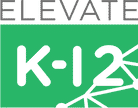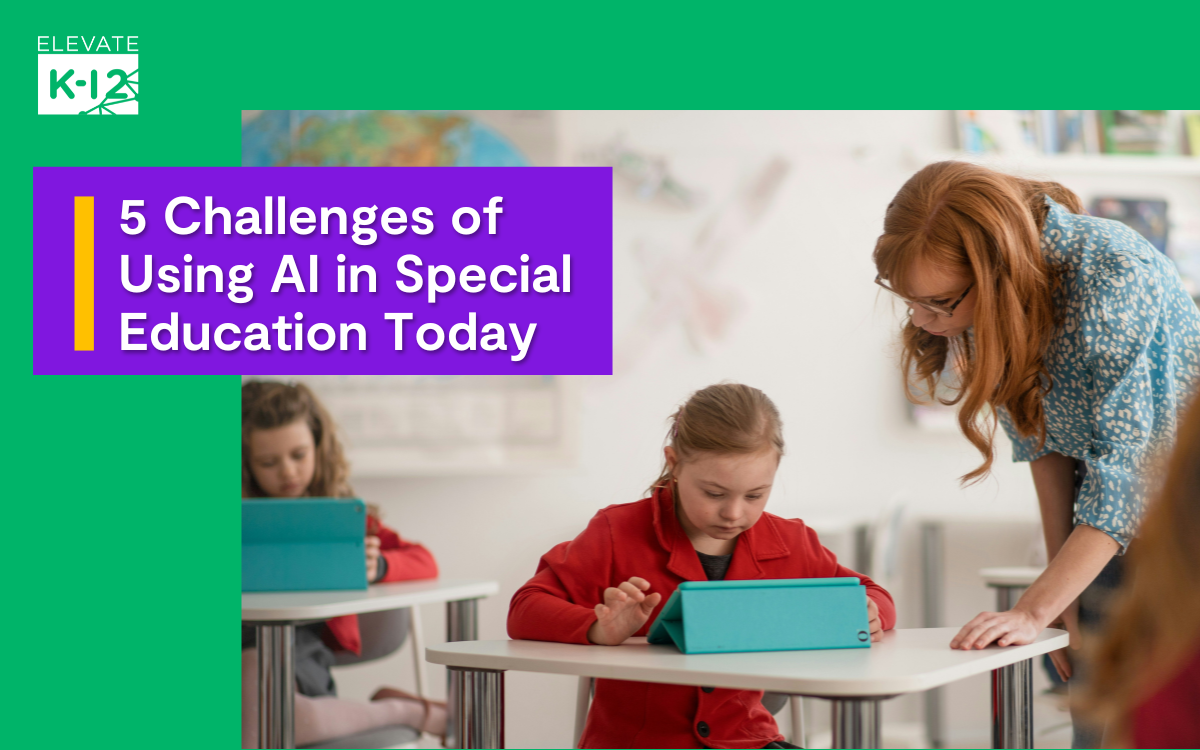A New Era for Special Education: Promise, Pressure, and Real Risks.
In classrooms across the country, a quiet revolution is unfolding.
According to new research from the Center for Democracy & Technology (CDT), nearly 60 percent of special education teachers now report using generative AI tools to help draft IEPs or 504 plans. This is a dramatic jump from the year before.
The promise is undeniable: fewer hours of paperwork, faster goal-setting, greater personalization, and the potential to reclaim up to 6 weeks of instructional time each school year. But alongside the excitement lies real risk.
The same CDT brief warns that unchecked AI in special education could expose districts to IDEA non-compliance and FERPA violations, and, perhaps most importantly, erode the human expertise that makes an individualized education plan truly individualized.
At Elevate K-12, we believe AI can be a powerful partner for educators when it operates inside clear guardrails, with teacher leadership at the center. Here’s how the landscape is evolving, where the biggest challenges lie, and how our model turns those risks into opportunities for stronger, safer, more personalized instruction.
Challenge 1: Ensuring Legal Compliance in the Age of AI
The Individuals with Disabilities Education Act (IDEA) and Section 504 of the Rehabilitation Act both require that each plan be tailored to a single student’s unique strengths and needs.
Yet, as the CDT report and an October 2025 Education Week analysis point out, an AI-assisted IEP draft, especially one created from minimal data, can quickly drift from the law’s individualized intent.
Automated goal-language and templated accommodations may save time, but without teacher oversight, they risk producing “mass IEPs” that fall short of compliance and substance alike.
Districts also face new questions about authorship and accountability:
- If an algorithm generates a goal statement, who is legally responsible for its accuracy?
- Can an IEP that includes AI-drafted content hold up in mediation or due-process review?
Elevate K-12’s Perspective
At Elevate, our stance is clear: AI is a support tool, not a shortcut.
Our Special Education LIVE programs emphasize a teacher-authored model in which every AI-assisted draft is treated as a starting point, refined, validated, and approved by a certified special-education teacher.
This human-in-the-loop approach ensures that each plan reflects professional judgment, student data, and district standards, meeting both the letter and spirit of IDEA.
Challenge 2: Protecting Student Data and Privacy
If compliance is the first concern, privacy is the second. Generative-AI systems rely on vast data inputs without strict safeguards; those inputs can include personally identifiable information (PII) protected under FERPA and state privacy laws. The CDT report cautions that even seemingly harmless prompts (“Summarize Mateo’s reading accommodations”) may transmit identifying details to a vendor’s servers. Most open-access chatbots retain user data for model training unless an enterprise agreement prohibits it.
Recent state guidance echoes the warning: over two dozen states now explicitly advise schools not to input any student identifiers into unvetted AI platforms.
The Chicago Public Schools AI Guidebook goes further, requiring vendors to demonstrate data minimization and security-by-design before any classroom use.
How Elevate K-12 Addresses It
That’s why Elevate K-12 built its AI ecosystem around trusted, education-grade partnerships, most notably with MagicSchool AI. Through this partnership, Elevate teachers receive enterprise-level, FERPA-aligned access to a closed environment where no student data is stored, shared, or used to train public models.
Teachers can safely generate individualized lesson scaffolds, IEP goal starters, and accommodation suggestions without ever compromising student privacy.
In short, teachers gain the efficiency of AI without the exposure of the open internet.
Challenge 3: Preserving Personalization and Teacher Agency
In special education, personalization isn’t optional. It’s the entire purpose.
Yet generic AI models are built to generalize. Left unfiltered, they risk flattening nuance, reinforcing bias, or creating accommodations that look polished but fail to meet a specific learner’s actual cognitive, behavioral, or linguistic needs.
A recent Leadership Magazine feature noted that while AI can assist with idea generation, it “cannot replace the deep contextual understanding and empathy that define effective special education.”
The Elevate K-12 Approach
We’ve seen this truth firsthand.
In one large urban Midwestern district, students with IEPs enrolled in Elevate classes gained 33 points on STAR assessments in 2023-24, outpacing peers in non-Elevate classrooms. That growth came not from automation but from teacher-driven adaptation: certified educators using data to adjust pacing, scaffold content, and design interactive learning moments in real time.
Within our framework, AI enhances—not replaces—that process.
Teachers may prompt MagicSchool AI for sample goal phrasing or differentiated activities, but they remain the authors and editors of every decision. Our Inclusive Learning Coordinators ensure those plans stay dynamic, continually informed by progress-monitoring data and team collaboration.
Analee Ochao, an Elevate tacher who is Generative AI and Magicschool AI certified says, “I love using AI! It does cut down my time in differentiating a lot.”
Challenge 4: Building AI Literacy and Professional Confidence
Even as adoption soars, only 22 percent of teachers report receiving formal training on AI use and risk management, according to CDT’s 2025 survey. That gap can lead to either underuse (fear of doing something wrong) or misuse (unaware of compliance pitfalls).
To close it, districts need professional learning that blends ethics, pedagogy, and practice, not just tech demos.
How Elevate K-12 Supports Teachers
Every Elevate special-education teacher participates in structured onboarding through ongoing coaching cycles on high-quality virtual instructional practices. We extend that model to AI literacy: educators learn not just how to use tools like MagicSchool AI, but when and why.
- Ethical use: what information is appropriate to enter; how to cite or flag AI assistance.
- Instructional design: using AI for differentiation, not duplication.
- Reflection: evaluating AI outputs through the lens of equity, bias, and accessibility.
This professional learning isn’t just theoretical. We embed it in the daily rhythm of our programs, reinforced through real-time feedback in the T.E.A.C.H. Tool, our AI-supported observation system that highlights engagement and instructional quality while protecting teacher agency.
Challenge 5: Scaling Innovation Without Sacrificing Compliance
Perhaps the biggest challenge for district leaders is strategic: how to embrace AI-enabled efficiency without inviting legal or reputational risk. Boards and superintendents are asking:
- What guardrails are enough?
- Who owns the policies?
- How do we balance innovation and oversight?
Elevate’s answer is partnership.
Our Special Ed LIVE model provides certified teachers, adapted content, accommodations and modifications, inclusive-learning coordination, and data reporting within a district-integrated, compliance-ready structure.
When AI enters that ecosystem, it operates within a governance framework that already aligns with FERPA, IDEA, and state standards. Districts gain the benefits of scale, more consistent documentation, faster feedback cycles, and stronger progress monitoring without exposing themselves to policy or privacy gaps.
In short, we transform AI from a rogue experiment into a managed, auditable asset that strengthens both compliance and instruction.
Elevate’s Vision: Human Expertise, Amplified by Responsible AI
The promise of generative AI in special education is real: faster drafting, richer lesson design, and more time with students. But the core of special education has never been paperwork efficiency; it’s human connection, judgment, and adaptation.
That’s why every Elevate K-12 program starts and ends with the teacher.
Our certified educators bring expertise and empathy; AI brings speed and scaffolding. Together, under clear guardrails, they help students with IEPs access rigorous, grade-level content, close achievement gaps, and experience learning that’s genuinely personalized.
We know the concerns around “mass IEPs” and data privacy are valid.
That’s why we’ve built systems where AI becomes a support tool, not a shortcut:
- Never enter identifiable student data into unvetted AI tools.
- Use MagicSchool AI, our secure, FERPA-aligned partner, for all generative tasks.
- Validate, edit, and remain the author.
- Pair AI with progress monitoring and collaboration so goals evolve with students.
When those principles guide practice, AI doesn’t replace the art of teaching. It elevates it.
Looking Ahead
Artificial intelligence will continue reshaping how educators plan, personalize, and document instruction.
For special education, the stakes and the potential are even higher.
Districts that act now to create ethical, compliant, teacher-centered frameworks will not only protect themselves legally but also empower their teachers to do what they do best: design instruction that changes lives.
At Elevate K-12, we’re proud to stand beside them, combining certified expertise, secure technology, and a relentless focus on equity, to ensure AI serves students, not the other way around.
About the Author
Kim Kays is a seasoned education leader with 20+ years of experience across K-12, non-profits, and edtech. As VP of Partnership Solutions & Strategy, she develops instructional solutions and equips sales teams to align them with district needs. A former principal in Chicago and Oakland, Kim drove transformative gains in biliteracy and student achievement, and founded a non-profit delivering arts education to thousands. She’s held national advisory roles with Nearpod and Renaissance, and is recognized as a thought leader focused on elevating instruction and closing opportunity gaps. Kim currently serves as Elevate’s VP of Partnership Solutions & Strategy, leveraging her experience and expertise to ensure districts across the country are able to meet their students needs.


